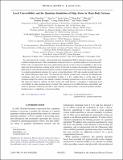Local Convertibility and the Quantum Simulation of Edge States in Many-Body Systems
Author(s)
Franchini, Fabio; Cui, Jian; Amico, Luigi; Fan, Heng; Gu, Mile; Korepin, Vladimir; Kwek, Leong Chuan; Vedral, Vlatko; ... Show more Show less
DownloadPhysRevX.4.041028.pdf (599.4Kb)
PUBLISHER_CC
Publisher with Creative Commons License
Creative Commons Attribution
Terms of use
Metadata
Show full item recordAbstract
In some many-body systems, certain ground-state entanglement (Rényi) entropies increase even as the correlation length decreases. This entanglement nonmonotonicity is a potential indicator of nonclassicality. In this work, we demonstrate that such a phenomenon, known as lack of local convertibility, is due to the edge-state (de)construction occurring in the system. To this end, we employ the example of the Ising chain, displaying an order-disorder quantum phase transition. Employing both analytical and numerical methods, we compute entanglement entropies for various system bipartitions (A|B) and consider ground states with and without Majorana edge states. We find that the thermal ground states, enjoying the Hamiltonian symmetries, show lack of local convertibility if either A or B is smaller than, or of the order of, the correlation length. In contrast, the ordered (symmetry-breaking) ground state is always locally convertible. The edge-state behavior explains all these results and could disclose a paradigm to understand local convertibility in other quantum phases of matter. The connection we establish between convertibility and nonlocal, quantum correlations provides a clear criterion of which features a universal quantum simulator should possess to outperform a classical machine.
Date issued
2014-11Department
Massachusetts Institute of Technology. Department of PhysicsJournal
Physical Review X
Publisher
American Physical Society
Citation
Franchini, Fabio, Jian Cui, Luigi Amico, Heng Fan, Mile Gu, Vladimir Korepin, Leong Chuan Kwek, and Vlatko Vedral. "Local convertibility and the quantum simulation of edge states in many-body systems." Phys. Rev. X 4, 041028 (November 2014).
Version: Final published version
ISSN
2160-3308